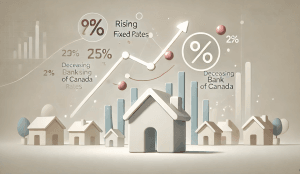Refinancing
Refinance Your Mortgage
“My friend rolled their car loan and other debt into their mortgage. Can you do that for us?”
When someone says this to me, I know what they really want to do is use the equity they’ve built up in their home to help alleviate some of their financial pressure and free up cash-flow. And, yes, I can help with that!
What do you mean by ‘equity they’ve built up in their home’?
When you own a home you are building a sort of savings account. I like to call it the Forced Canadian Savings Account. As each year passes, your home likely increases in value. On top of that, you are paying down your mortgage. An asset you’re actively paying down is also increasing in value. Together, the two processes build equity.
Do all homes increase in value?
When you add on the layer of sweat equity for the work you have done to your home or paid someone to do to your home, you are creating greater equity in the property. From replacing vintage shag carpet to planting a rose garden to remodeling a kitchen – your investments are helping the value of your home go up, up, up.
Another factor in house values is time. Most homes appreciate in value over time and in certain cities like Ottawa, demand is high as the population grows.
So many of my past and present homeowners take incredible pride in owning a home, in paying it off, and using it as a tool to assist financially during or for retirement. In nearly all cases, their homes have appreciated in value – sometimes dramatically. But don’t take our word for it – we work with highly experienced home assessors that take into account everything from comparable properties in the neighbourhood, your square footage, the condition of the home, and the number of upgrades and features it has.
Why is equity such a big deal?
On occasion, we need to take some of this equity out of the home.
From time to time, life happens and it almost happens in threes, right? If you do not have an emergency savings account set-up, you may have relied on credit cards or lines of credit and maybe even personal loans. When the burden of the debt becomes too heavy, you may want to use some of the equity you have built up in the home. Or maybe you renovated your kitchen and now you would like to take advantage of the home equity you’ve created to pay the line of credit or credit cards that were used to pay for the work that was done. You can use your equity for that!
So how exactly can I take advantage of this equity to pay for things?
Some of the factors we look at is how much it would cost to remove some of your house equity and put it back in your pocket. If you’re making the choice to break one mortgage contract and get another, there will be penalty costs rolled in and we want to make sure that this choice still makes good financial sense.
There are rules and guidelines we have to follow along the way. There are federal guidelines set up to protect us from ourselves. For instance, you can access up to 80% of the equity in your home. Of course, this is all contingent on your credit not being too badly bruised. It’s also one of the main reasons we work with an assessor. We want to make sure your house is indeed worth what you estimate it is so you don’t get into valuation troubles down the road.
How does this work in real life?
Let’s take a look at the example of Mr and Mrs Smith, who’ve had a rocky year.
Unexpectedly, Mr Smith lost his contract and was left without income. As a contractor and self-employed individual, Mr Smith didn’t have access to EI. But good news came after six months when Mr Smith found work – and a whole lot of relief. Thankfully, during the time he was off, Mrs Smith was able to help out by tutoring and the family was able to use their emergency funds to keep them afloat. Sadly, during the six months, Mr and Mrs Smith need to use their line of credit to pay for a new furnace, car transmission, and daily food expenses, leaving the line of credit with a $35,000.00 balance. Even though their future employment seemed secure, Mr and Mrs Smith were very anxious about the line of credit balance and decided with the rates so low they would take advantage of equity in their home, pay line of credit, and refill their emergency fund. They would need $35,000 for the line of credit, $30,000.00 to replace the funds in their emergency fund and $5000.00 for expenses for a total of $70,000.00 to set them back on their financial feet.
Let’s see if they can make it work with their $400,000 home and take a look at the math.
The Federal Maximum Math:
$400,000.00 <- Value of the home
$ – 80,000.00 <- Remember at least 20% that must stay in the home.
$320,000.00 <- Available to use (Less: Existing mortgage, penalty if applicable, and legal fees)
Mr and Mrs Smith Refinance Example:
$400,000.00 <- Value of the home
$130,000.00 <- this is the 33% equity that will stay in the home
$270,000.00 <- Available to use
$200,000.00 <- Existing mortgage – to be paid at the lawyers office
$70,000.00 <- That leaves them $70,000 in available equity to address their debts.
$3,500.00 <- Penalty for breaking their existing mortgage insurance + assorted legal and appraisal costs
$35,000.00 <- To pay their Line of Credit debt
$30,000.00 <- To restock their emergency fund
$1500.00 <- Remaining to use as they wish.
Word to the wise: Just because you *can* take out up to 80% doesn’t mean you have to – or you should! In the case of Mr and Mrs Smith, a more modest 67% works best for them.
Wait! What exactly are these penalties?
Bank fees seem to be an unavoidable fact of life. If you break your mortgage in order to sign with a new lender or to change your existing contract so you can access the equity within your home, your bank will charge you a penalty. Thankfully, this is not an out of pocket expense. The penalty will be capitalized or rolled into the new mortgage.
Legal fees are typically about $900. Your house appraisal fee, which is typically about $350, maybe be reimbursed back to you upon closing.
Amazing! Let’s do this! Can it happen tomorrow?
All things going well, it takes at least 3 weeks to complete the process. The timeline depends in part on you and how long it takes to get documents to me.
We can get started and make great progress tomorrow but this is a multi-step process with many different players. It takes some time.
I’m busy. Do we need to meet in person?
No. Although I like seeing everyone in person at least once. I also know you are busy, and life is busy. I am happy to use ZOOM, the phone, or meet in person with you.
What are the documents needed to move forward?
Let’s talk paperwork! It’s time to make your list and check it twice because lenders and banks are rather particular in their requirements. Before you submit your paperwork, read over it to make sure all the listed information is included.
See the document section for a list of documents you may need.
General Process: Next Steps
First, once you’ve collected all your documents, pause for a cup of coffee. Maybe something stronger! You’ve earned it. Once you have all your documents, these are the next steps.
- Send the required documents to me electronically at admin@JacquieBushell.ca. I will submit them to the appropriate parties for approval.
- Once approved, I will order the appraisal for your property. In doing so, I’ll send you a link so you can pay the appraisal company directly. This amount will be reimbursed to you once the file has closed.
- Following the appraisal, once we have the final approval I will have you sign the new mortgage documents. You’ll be signing the documents with me – in person or by Zoom.
- Once the lender gives us the File Complete Notification, you will receive a call from FCT/or your lawyer to set up an appointment.
What the heck does FCT mean? It means the First Canadian Title and the FCT acts as the legal entity for the lawyer. They will register the new mortgage on title.
Other good words to know include Payout Statement (The payout statement is provided to FCT from your current lender, it will include your current mortgage balance, your discharge fee and any property tax payments that you have on file with your existing lender. In most cases the property taxes are deducted from proceeds lowering your mortgage balance.)
Commitment (Your mortgage approval document) and Identification Form (This is the form that is completed by the FCT agent. The purpose of the form is to ensure mortgage fraud is not being committed.)
- A Signing company (FCT/FNF) will come to your home to sign the legal mortgage registration at a time and date that are suitable for your schedule. If you are taking equity or funds out of the home, you may want to use a lawyer for clearer communication and timelines.
Chat with Jacquie
Phone: 613-882-3201
Don't Miss Your Mortgage Renewal
Fill out my web form and I will personally email you to remind you of your mortgage renewal.



